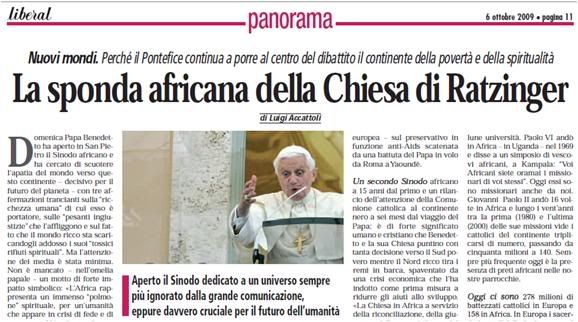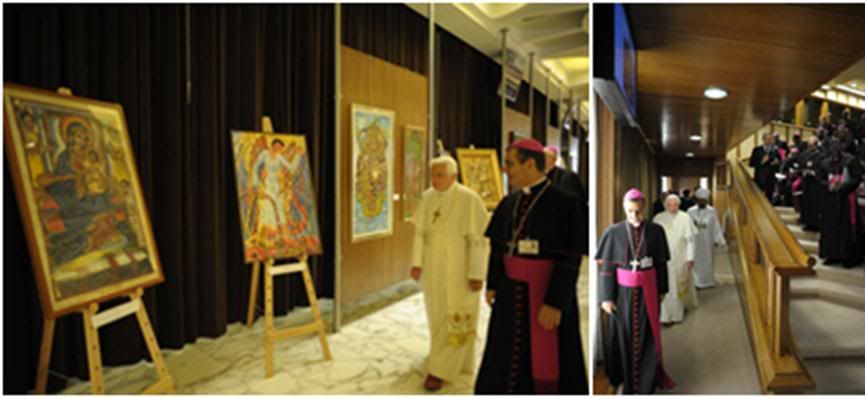
 The African side of Papa Ratzinger's Church:
The African side of Papa Ratzinger's Church:
Why the Pontiff continues to focus attention
on the continent of poverty and spirituality
by Luigi Accattoli
Translated from

Oct. 6, 2009
 'The Synodal assembly opens, dedicated to a continent increasingly ignored
'The Synodal assembly opens, dedicated to a continent increasingly ignored
by the major media although it is really crucial to the future of mankind.'
On Sunday, Pope Benedict XVI opened the second Synodal assembly on Africa at the Vatican, seeking to shake the world out of its apathy towards the continent - which is decisive for the future of the planet - with three incisive comments on the 'human riches' which it has, the 'onerous injustices' that afflict it, and teh fact that the rich world is discharging its 'toxic spiritual wastes' on the continent.
But media attention was minimal.
The papal homily on Sunday did not lack a 'slogan' with great symbolic force: "Africa represents an immense spiritual 'lung' for a humanity that appears to be in a crisis of faith adn hope".
Strong words that met with scant attention. The Italian newspapers did not report the Pope's statements online Sunday nor did it make Page 1 of their paper editions yesterday.
The TV newscasts showed a few images from Sunday but only in reference to the Pope's solidarity with victims of the mudslides and flooding in Sicily.
As it was on the occasion of Benedict XVI's trip to Cameroon and Angola last March, one can bet that the world - which has always found it difficult to be concerned about Africa - will turn a deaf ear to this Synodal assembly.
The media world signals its disinterest mainly because of cultural laziness as well as under-estimating the occasion, in the belief that Africa is generally bad news, to be given in small doses.
I remember the feelings we had as Vaticanistas during the first Synodal assembly on Africa in the spring of 1994: While the bishops' meetings were going on, the genocide in Rwanda was unfolding, and therefore, there was quite an opportunity in Rome to interview the first-class intellectual leadership of the entire continent.
But space for Rwanda was minimal in the media, just as it was minimal last March for teh Pope's African visit - if one excludes the controversy - entirely European [and American] - over the usefulness of condoms against AIDS, after a statement made by the Pope on the flight to Cameroon.
A second African synod 15 years since the first one is a refocusing of the attention of the Church on the Black Continent six months since the Pope's visit.
It is of great human and Christian significance that Benedict and his Church have centered the attention of the Catholic communion towards the world's poor South while the rich North has drawn back, frightened by an economic crisis which has led the developed nations, as a first measure, to reduce development aid to poorer countries.
"The Church in Africa in the service of reconciliation, justice and peace" is the theme of this Synodal assembly. The agenda makes clear there is an awareness of what the Church wants to be able to do for Africa.
The attention of the Papacy to that suffering continent is not new. Without going all the way back to missionary efforts under Pius IX and Pius XI, who were the earliest committed advocates for Africa, one must remember that
there were already black cardinals by the mid-20th century - that is, even before black Americans were allowed to register in some universities in the USA.
[Governor Wallace standing at the gate of the University of Alabama to protest a black enrollee was in the early 1960s.]
Paul VI travelled to Africa - Uganda in 1969 - and told a symposium of African bishops in Kampala: "You Africans are now missionaries to your own people". Today they are missionaries even to us in Italy. The presence of African missionary priests in our parishes is becoming more frequent.
John Paul II travelled 16 times to Africa, and during the twenty years between his first trip (1980) and the last (2000), the Catholics on the continent almost tripled in number, from 50 million to 140 million.
Today there are 278 million baptized Catholics in all of Europe and 158 million in Africa. But in Europe the number of Catholic priests has been diminishing annually by at least a thousand, while the number of priests in Africa is growing annually by the same number.
Working on the basis of these figures and hypothesizing that the present trend continues, the Jesuit magazine
Popoli forecasts that the number of African Catholics could surpass those of Europe within 25 years.
That rapid and providential growth is the primary reason for Pope Benedict XVI's interest in Africa.
[After the more compelling reason of wanting to help all peoples who are most in material and spiritual need.]
 The Holy Father on his way to this morning's General Congregation.
A similar article to Accattoli's:
And the silence of the press
The Holy Father on his way to this morning's General Congregation.
A similar article to Accattoli's:
And the silence of the press
descends on the Pope's words
by Lucio Brunelli
Translated from

Oct. 5, 2009
There was no lack of interesting highlights - 'news', we journalists would say - in the opening Mass for the Synodal assembly on Africa.
In St. Peter's Basilica, before a crowd of African cardinals and bishops, the Pope pronounced strong words freely.
The old colonialism is done with, the Pope said, but a new colonialism threatens the vast continent which is across the sea from us. The First World does not only depredate Africa for its natural resources, but exports and discharges its 'toxic spiritual wastes' on the southern part of the planet.
That is an accusation that is harsh and impassioned, that only someone who has no interests to protect could formulate with clarity and freedom.
And yet the two major newspapers online [
Corriere della Sera and
La Repubblica] carried not a single line Sunday afternoon after the Mass about the African synod and the words of the Pope.
And this is far from whining victimism which equates the media visibility of the Catholic Church with begging for a bit more column inches in the press.
Observant Catholics are a minority in this nation and they know that the terms most appropriate to the Christian vocabulary - faith, hope and charity - say humanly little or nothing at all to the wider public. It's not a question of ill will, simply the reality of secularization.
But this is a different case altogether. It has to do with the quality and honor of the information itself.
Thus far, the Pope makes the news only if he can be portrayed as extreme on moral issues. Or exploited, from time to time, by one of the two opposing political 'fan clubs' which use nespapers and TV as their virtual stadium.
Papa Ratzinger on Africa apparently interests the media only if he launches new anathemas against condoms. He is of no interest when he unmasks the altars of the great powers, or if he gives voice - for almost a month at the Vatican - to the bishops of the continent that has the highest demographic increases in the world.
A continent that we should all be interested in and know better, if only for selfish reasons, because her destiny always concerns our own as well.
Cardinal Angelo Bagnasco was right when he said that the secular world would prefer a Church that is subservient and mute.
But reporting information selectively hurts our own profession as journalists, even before it offends the faithful.
Whether the newspaper is rightist or leftist, things have not changed - i.e., who cares about Africa and its tragedies? At most, we will concern ourselves with saying Yes or No to whether illegal immigrants should be driven back from Italian shores (without asking why and from where these unfortunate people are fleeing].
Problem #1 in the Italian media is not the little freedom that the press enjoys. It is the disconcerting degradation of the information reported. Its contents, the poltical stagecraft that straddles everything, the failure to report realities seen from below, by the citizens, and the absence of an open outlook on the world.
Whether it is the TV newscasts on channels that belong to a political leader or on the leading private commercial TV. When both combine, it certainly is not insignificant. But even newspapers that belong to various houses of capitalism leave the impression of a fake pluralism. Which is bad.
This silence about the African synod is not a good sign, because it is not right to report the Church only for its caricaturish traits or whatever happens to be exploitable for political purposes of the moment.
And that's degradation of information. But TV and newspapers are merely the mirror of what the public wants and deserves: this is the response given in an attempt to shut up those who demand more worthy news. It is upto all of us to prove that they are wrong.
[Modificato da TERESA BENEDETTA 07/10/2009 13:11]